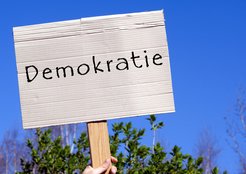Does Democracy Need to Be Protected?
Ralf Poscher in the news
Democracy is facing challenges, such as the rise of right-wing populist parties in many world regions. Anti-democratic positions have often already permeated the mainstream of society. Does this mean democracy needs to be protected?

“Normally, democracy does not need protection.” These are the words of Ralf Poscher, one of three directors at the Max Planck Institute for the Study of Crime, Security and Law and head of the Department of Public Law. “Democracy protects itself through its institutions and public discourse. It has a kind of self-immunizing power,” explains the law professor.
Under exceptional circumstances, however, democracy must be at liberty to defend itself, for example when large anti-constitutional groups establish themselves or when anti-constitutional opinions spread in associations or parties, and these organizations resort to militant and organized actions against the constitution. In such cases, the very foundations of democracy are threatened, and mechanisms are needed to protect democracy. One example of such a protective mechanism is the banning of political parties.
High Hurdles for Party Bans
The problem with these protective mechanisms is that they are contradictory. While they attempt to protect democratic institutions, on the one hand, they also interfere with democratic principles on the other. “We have to be very careful when we erect such barriers,” emphasizes Ralf Poscher.
For example, the hurdles for banning political parties in Germany are very high. A party can only be banned under very specific circumstances. It is not sufficient to prove that the party is violating the constitution. It must also be deemed likely that the party will be successful with its actions and that democracy is actually under serious threat. So far, only two parties have been banned in the Federal Republic of Germany: the Socialist Reich Party (SRP) in 1952 and the Communist Party of Germany (KPD) in 1956.
A ban on the right-wing National Democratic Party of Germany (NPD) was rejected by the Federal Constitutional Court in 2017. The court did share the view that the NPD pursued a “political agenda aimed at elimination of the existing free and democratic basic order” and that it also worked “systematically and with sufficient intensity to achieve its goals directed against the free and democratic basic order.” Yet, the court did not see “concrete weighting factors” indicating successful implementation of the NPD’s anti-constitutional goals and therefore rejected the attempt to outlaw the party.
Nobody is Arrested for Having an Opinion in Germany
Germany’s democracy is under pressure for another reason, however: many people seem to be losing confidence in the constitutionally guaranteed right to freedom of speech. According to a survey conducted by the Allensbach Institute for Public Opinion Research and Media Tenor in December 2023, 44% of respondents replied that it was better to be cautious when expressing their opinions in public, especially when it comes to conservative or right-wing populist views. Only 40% said they felt they could express their political opinions freely. This is the worst result since the surveys were first conducted in 1953.
According to Ralf Poscher, the impressions of his fellow Germans do not correspond to reality. “There is no threat to freedom of opinion from ‘the system’,” explains the legal scholar in a report in Max Planck Forschung magazine. Nobody is ever arrested for holding an opinion in this country. “As long as we are merely trying to convince others with arguments, positions, and views, we are free to engage in debate,” the expert further explains. It is also possible to advocate things that do not conform to the constitution. “As long as it’s only personal opinion, you could even champion the reintroduction of the monarchy.”
Uncomfortable and extreme opinions are therefore protected. However, there are limits here too, including a one’s personal rights, according to Poscher. If these are violated, for example through insults or defamation, the state may intervene. “Hate speech, symbolic gestures like the Nazi salute, and incitement to hatred and violence are prohibited. It is also not permitted to show up at assemblies in uniform or bearing arms in order to intimidate others.”
“Defensive Democracy” has been generated keen interest in the press recently and been the subject of much reporting in conjunction with the Max Planck Institute.
A selection of recent press reports:
„Die Große Freiheit“
„Meinungsfreiheit in Deutschland: Man darf so einiges sagen“
„Wird die Gesellschaft unfreier?“
Ralf Poscher on the Legal Protection of Democracy
„Wie wehrhaft ist die Demokratie in Deutschland?“
The research program of the Department of Public Law, headed by Ralf Poscher, has several overarching themes. Projects on public security law explore in depth how the legal system can react to societal threats in order to prevent criminal offenses and other types of harm from occurring in the first place. Browse the overview of our research projects at: https://csl.mpg.de/en/public-law/projects.











